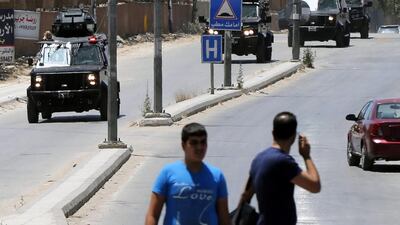Jordan’s peaceful stability was disrupted last month by a terror attack on the Baqaa Palestinian camp. Five military officers were killed in what appeared to be a lone wolf attack.
No group has claimed responsibility for the attacks, but some have pointed at the many thousands of refugees that Jordan hosts and the links that some of them may have to ISIL and other extremist groups.
The residents of Baqaa struggle under the weight of poverty and low prospects. Such conditions have made for fertile ground for violence, radical thought and hatred.
Several extremists were killed in the north of the country this year and the latest attack has also been characterised as possible payback for those killings.
Jordan has a very strong security apparatus and it has been boosted further in the five years since the outbreak of civil war in Syria.
The authorities have taken strict measures to curb the movement of those who wish to participate in the Syrian conflict and have closed the borders in the south. They are refusing to let any more displaced Syrians or Iraqis into the kingdom.
Since the attacks, Jordanian security has been on high alert and the government has taken measures to contain extremist ideology. Among other measures, they are observing mosque worshippers and listening to clerics for potential signs of hate speech and radicalisation.
When ISIL burnt to death Maaz Al Kassasbeh, a Jordanian air force pilot it had captured, it further galvanised Jordanians around the idea that moderation is the key to peaceful stability.
Jordanians are politically mature and have learnt from what is happening next door in Iraq and Syria.
They have seen what chaos and destruction can do and they are intent on ensuring that the pattern is not repeated inside their own borders.
As such, Jordan has tightened controls on the Muslim Brotherhood, which is said to exert a great deal of influence at the Baqaa refugee camp. The organisation’s offices were closed this year over its failure to obtain the proper authorisation to operate.
Previously, the movement was involved in long and fractious debates over its priorities. The election of Mohammed Morsi as Egypt’s president in 2012 split the Jordanian Brotherhood into one legal and one illegal group. The organisation is still fractured along these lines.
Another element is Salafist thinking, and the adoption by some Jordanians of Al Qaeda’s ideology following that group’s actions in Afghanistan in the 1980s.
Abu Musab Al Zarqawi, the founder of Al Qaeda in Iraq, established sleeper cells in Jordan which moved to Iraq in 2003 to fight American forces. Many of these have since gravitated towards ISIL.
The issue of security will be on the minds of many Jordanians in the lead-up to parliamentary elections in September. Given recent events, one would expect that mood to continue to reflect the ideals of moderation and stability.
Maha Samara is a journalist in Beirut

